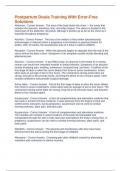DISCUSS THE FREE WILL AND DETERMINISM DEBATE. REFER TO TWO TOPICS YOU HAVE STUDIED IN
PSYCHOLOGY IN YOUR ANSWER (16)
Free will can be defined as humans being self-determined, meaning that we are free to make our
own decisions that shape our lives without the influence of internal and external forces. The
humanistic approach, for example, emphasises free will by stating that there are forces that are out
of our control but we can freely choose to reject them. Whereas, determinism is defined as humans
having little to no control over their lives because behaviour is controlled by external and internal
forces. Moreover, there are two sides of determinism, known as hard and soft determinism. Hard
determinism is the belief that free will is an ‘illusion’, every action is always a product of internal and
external forces making behaviour always predictable as it is pre-determined. Soft determinism is the
belief that our behaviour has some element of free will but is still partly influenced by internal and
external factors we cannot control.
Similarly, psychology can be described as deterministic as we are constantly attempting to create
general laws of behaviour through controlling it (manipulating the independent variable) and
hopefully predicting it (measuring the effect on the dependent variable) in laboratories. This way, we
have the chance to establish cause and effect also controlling extraneous variables, making
psychology not only more credible but more scientific.
Furthermore, there are three main types of determinism; psychic, environmental and biological.
Psychic determinism can be explained through Freud’s defence mechanisms theory as an example. It
is the idea that our behaviour is a product of unconscious conflict. Freud proposed that our
unconscious represses disturbing thoughts away from our conscious and those thoughts influence
most of our behaviour. Environmental determinism refers to our behaviour being a product of
external factors only (which we cannot control), mainly previous experiences. An example of this are
behaviourists such as Pavlov and Skinner who carried out animal studies and concluded that human
behaviour is learned through classical and operant conditioning. Finally, biological determinism is
the view that all aspects of our behaviour are always caused by internal factors, meaning that our
behaviour is determined by genes, neuro-transmitters, brain structure, hormones, etc. For example,
the biological approach assumes our behaviour is completely out of our control, only focusing on
neural processes.
A limitation of determinism is that it fails to explain or predict all types of behaviour such as
intelligence and depression. Studies have shown that monozygotic twins (who share 100% of genes)
have 80% of similarity for intelligence and 40% in the likelihood of depression. This is a limitation
because it shows that genes do not entirely determine behaviour. The concordance rates imply that
our environment must have an impact on behaviour too but not completely. Therefore, biological
and environmental determinism are over generalising behaviour, also taking a reductionist approach
to explain it.
Another limitation of determinism is that it serves an excuse for those trying to justify a crime they
may have committed. A criminal may be claiming to suffer from mental disorders by faking
symptoms such as hallucinations or delusions (schizophrenia symptoms). Berkowitz, known as the
“Son of Sam” is an American serial killer who pretended to hear voices which ‘demanded him to kill’
and later on confessed he used it as an excuse to get a lighter sentence. This then started to become
a trend between accused murderers. This shows that determinism can contradict law principles





